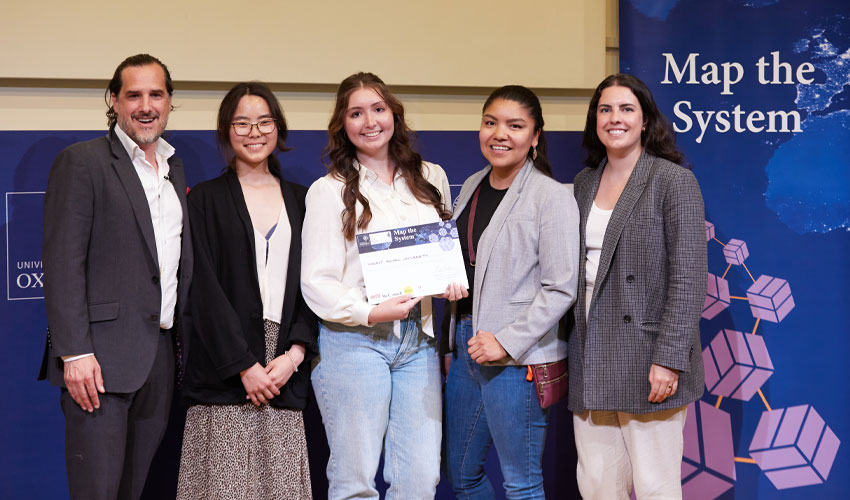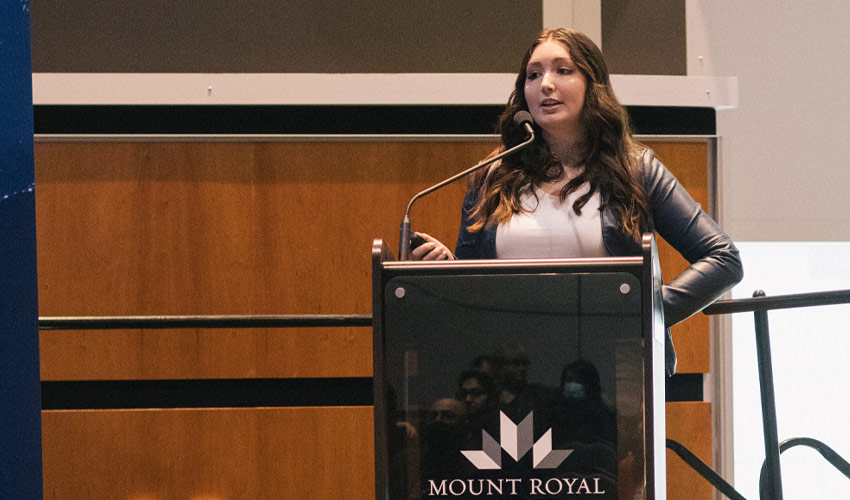ATCO and MRU team up for systems thinking
Understanding the problems of today leads to a better tomorrow
— Mount Royal University | Posted: December 7, 2022

(L-R) Peter Drobac, director, Skoll Centre for Entrepreneurship at the University of Oxford; Mizuki Oshita, MRU Map the System (MTS) campus co-ordinator; Kaitlyn Squires, Bachelor of Science — General Science alumna and MTS participant; Latasha Calf Robe, MTS program lead; and Amy Rintoul, MTS Canada program support, Institute for Community Prosperity, at the MTS Oxford finals last spring.
Mount Royal University’s Institute for Community Prosperity (ICP) and ATCO are celebrating the formation of a forward-thinking partnership that will ensure the growth and development of the ICP’s signature Map the System program as well as ATCO business directives. The partnership will provide students increased opportunities to deepen their research competence and understand important and complex social challenges using a systems-thinking approach. It will also allow ATCO employees access to Map the System education and idea cross-pollination with emerging talent.
As a new signature sponsor of Map the System, ATCO has made a three-year commitment of $250,000 per year ($750,000 total). As part of the agreement, the ICP will work with ATCO’s Corporate Transformation Team to ensure there are meaningful engagement opportunities for ATCO SpaceLab participants and other ATCO employees to access Map the System tools, learnings and training.
SpaceLab is an enterprise-wide framework of collaborative support for the creative energy of ATCO’s people and a source of funding and expertise for any ATCO employee with the desire to pursue sustainable new value for the company.
“What's unique about this sponsorship is that ATCO is investing in students across Canada as we reciprocally invest in their employees’ learning,” says James Stauch, director of the ICP. “This is a company that is working on commercial innovation solutions and new technologies, new approaches to business, new areas of commercial opportunity. And they see Map the System as integral to that.”
A global challenge, Map the System is hosted and managed by the Skoll Centre for Social Entrepreneurship within the Saïd Business School at the University of Oxford. The ICP runs Map the System not just within MRU, but nationally. Last year, 64 schools participated worldwide, with 20 from Canada. ATCO’s donation will assist with expenses for students to attend national and global competitions and provide support for the ICP in operating the program. Students have access to incredible learning opportunities, workshops and materials, and the ATCO funding will allow for more capacity and agility.
ATCO’s Corporate Transformation Team and the ICP share an interest in focusing the majority of energies, time and intellectual capital on understanding “the problem,” whether social or environmental in nature, and regardless of whether there is commercial potential or whether the “solution space” lies elsewhere, explains Stauch.
George Constantinescu, chief transformation officer and senior vice-president at ATCO says, “ATCO’s vision statement is ‘Delivering inspired solutions for a better world’. A clear, deep and factual understanding of the complex problems of today, and the rich opportunities of tomorrow, is critical to delivering on this vision.
“ATCO SpaceLab is engaging with the challenges of developing this understanding by emphasizing the question being investigated, its context and the multitude of legitimate perspectives that bear on it. We resist the temptation of expediently superficial solutions in favour of deeper understanding of the problems. In this respect, we are kindred spirits with our friends at the Institute for Community Prosperity at Mount Royal University and the Map the System Canada program, which we have the honour of sponsoring. Through this engagement with MRU and the leaders of tomorrow it educates, ATCO will support the ‘systems thinking’ approach and the mentorship of the next generation of Canadian leaders.”
What typically happens in a corporate culture is there is a lot of social and cultural pressure for employees to come up with fast solutions to an issue, Stauch says.
“The problem is then most of their time is spent engineering a rationale to that solution rather than spending that time and energy really understanding the problem, understanding the context. The better you understand that context, the better off your solution is likely to end up being, or the more likely you'll end up in a place of possibility rather than a dead end. Systems thinking is also helpful in really understanding why things are the way they are, how tricky it is to change things, and where the hopeful leverage points are.”
In addition to Map the System education, ATCO is looking at hosting virtual apprenticeship opportunities, with SpaceLab taking part in exchange sessions where new, novel and deeper insights can be shared between students, educators, the SpaceLab and the Map the System team.
“ATCO has really nailed the concept of ‘shared value,’ where companies work with entities that actually help them further their own business objectives. But at the same time they're doing social good. It's more about a liberal overlap of interests rather than a transactional relationship, and I would say this is a very, very good example of shared value,” Stauch says.
The Map the System methodology and impact
Map the System is the only post-secondary student challenge at either a global or national level that focuses solely on a problem. The program expands undergraduate students’ capacity to undertake interdisciplinary research while focusing on opportunities to make a difference in the world on a pressing current issue. A bridge between students-as-learners and students-as-changemakers, Map the System research is real-time orientated, with students rewarded for their in-depth understanding of a challenge, their knowledge of what solution efforts have already been tried and their identification of gaps or chances for greater impact. The complex findings must then be communicated effectively in a way that can be easily understood by the public.
Mount Royal continuously performs very well in Map the System, with MRU students moving on to compete globally in five of the last six years. Recent Bachelor of Science — General Science alumna Kaitlyn Squires was selected to go to Oxford this year for her for her study titled “Sex Workers in Canada Face Unequal Access to Healthcare.” MRU was also represented at Oxford in 2020 with a team study delving into whether or not Canadian charities are destined to fail.
In 2018, Bachelor of Nursing alumna Roisin Dillon took home the top prize for her submission and presentation highlighting possible solutions to the opioid crisis in Canada.
Latasha Calf Robe, program lead, research, scholarship and community engagement, manages Map the System Canada through to the Oxford finals. A Bachelor of Business Administration — General Management alumna, Calf Robe says, “With the new funding we are able to not just support students in asking big questions, we are able to support them in seeing themselves as changemakers and in encouraging them to take action in social and/or systems change.”
The program is consistently inspirational, Calf Robe says.

Recent Bachelor of Science — General Science alumna Kaitlyn Squires was selected to go to Oxford this year for her for her study titled “Sex Workers in Canada Face Unequal Access to Healthcare.”
“We see students’ thought processes challenged and changed in the span of a short few months. Students are tasked with questioning some of their really foundational beliefs and values, and watching that process and supporting them through it just reaffirms that change can happen. It starts on an individual level and radiates outwards, and we see students take that change and integrate it into their communities after Map the System.”
Social Work Diploma alumna and Map the System’s campus co-ordinator Mizuki Oshita took part in the program in both 2020 and 2021. For her 2021 project, Oshita, who came to Canada from Japan as an international student in 2018, joined forces with a team to study the overrepresentation of Indigenous children in Canadian child-welfare systems.
“Having studied in the Social Work Diploma program, I got to learn the severity and significance of what Indigenous Peoples have been going through,” Oshita says. “Over the course of conducting initial research related to our interests, we stumbled upon alarmingly high statistics on Indigenous children in child-welfare systems. We watched documentaries, read academic articles and books and reached out to local and nationwide Indigenous leaders. This gradual process demonstrates ‘falling in love with the problem.’”
Oshita says her experience has caused her to look at issues with a much larger analytical lens.
“When challenges are presented in any aspect of my life, instead of jumping straight into a solution search, I take time to understand what might be the root causes. This way, I notice that I am able to better separate my emotions and factuality.”
Updated student guide to come
Also as a result of the ATCO sponsorship, Stauch and Calf Robe are looking forward to updating the ICP’s Student Guide to Mapping a System into a series of lessons and training modules for anyone in any sector.
“We're always quick to specialize, especially in education, and that's needed sometimes. You do need to take stuff apart and look at it at its finest level in order to understand how it works, especially if you're talking about things that are mechanical, or sometimes even things that are biological.
“But for large social, economic and environmental topics, all these complex systems require many different disciplines, an ability to cross those divides and look at those interconnections. Our culture’s inability to think systemically about issues is one of the reasons we find it paralyzed in the face of such challenges. And that can be overwhelming, but there are many tools to make it less overwhelming” Stauch says.
Students can register for Map the System now. The deadline is Jan. 31, 2023.
